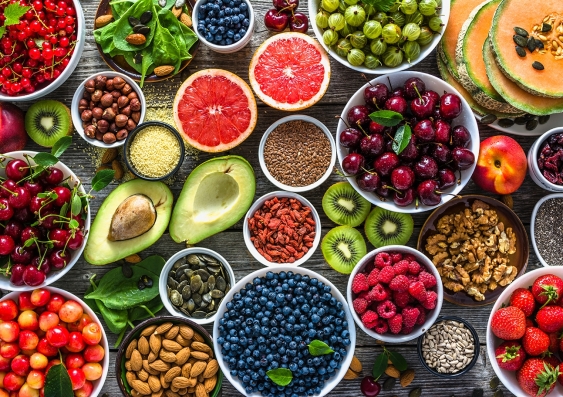The concept of ‘superfoods’ has become a buzzing term in the world of nutrition and health enthusiasts. These dietary superheroes are packed with vitamins, minerals, and antioxidants, essential for maintaining a healthy lifestyle. Including these power-packed foods in your diet is linked with numerous health benefits ranging from enhanced immunity to better digestive health. If you’re looking to revitalize your eating habits, understanding the science behind superfoods can be a game changer. Keep reading to explore how these nutrient-dense foods can uplift your health and well-being.
Understanding Superfoods and Their Nutritional Impact
The term ‘superfoods’ isn’t a medical designation but rather a name given to foods exceedingly rich in nutrients that have a beneficial effect on one’s health. They often contain a combination of disease-fighting antioxidants, fiber, healthy fats, and phytochemicals that all work in combination. Superfoods are not a cure-all, but incorporating them into your diet can lead to significant health improvements.
Take, for example, berries like blueberries and açaí, which have high levels of flavonoids—powerful antioxidants that help combat oxidative stress. Similarly, leafy greens such as kale and spinach are lauded for their vitamin and mineral content, contributing to bone health, improved vision, and a reduced risk of chronic diseases.
For those looking to enhance their diet with a selection of superfoods, nutriseeds.com offers a range of products that can be conveniently incorporated into any meal plan. From smoothie blends to snackable seeds, the options are endless for improving one’s nutritional intake.
The Role of Antioxidants and Phytochemicals in Disease Prevention
Antioxidants and phytochemicals are compounds found abundantly in superfoods, which have been studied for their role in disease prevention. These substances protect the body’s cells from damage caused by free radicals, which are linked to various chronic diseases including cancer, heart disease, and neurodegenerative disorders.
Fruits like pomegranates and vegetables such as tomatoes are brimming with antioxidants like lycopene and anthocyanins that support heart health and reduce the risk of certain types of cancer. The deep colors of these foods are usually a good indicator of their antioxidant content.
Similarly, the phytochemical sulforaphane, found in cruciferous vegetables like broccoli and Brussels sprouts, is known for its potential to protect against cancer. Whole grains and leafy greens also play a part in maintaining a balanced diet rich in these important compounds.
Superfoods for Enhancing Mental Health and Cognitive Function
The brain, like any other organ, requires proper nutrition to function optimally. Superfoods rich in omega-3 fatty acids, such as wild salmon and flaxseeds, play a pivotal role in brain health. Omega-3s are critical for maintaining the structural integrity of brain cells essential for cognitive function and mental health.
Furthermore, foods like nuts and seeds also provide a source of vitamin E, which may help prevent cognitive decline as you age. Similarly, dark chocolate, rich in cocoa flavonoids, has been linked to improved brain function and a decrease in the risk of neurodegenerative diseases.
Another key player is turmeric, which contains curcumin; this compound has shown potential in boosting brain-derived neurotrophic factor, a type of growth hormone that functions in your brain. Adequate levels of turmeric in the diet might contribute to better memory and mood regulation.
Incorporating Superfoods Into Your Diet: Practical Tips and Tricks
Incorporating superfoods into your diet doesn’t have to be complicated or costly. One simple approach is to ‘eat the rainbow’—choosing fruits and vegetables of different colors ensures a broad range of nutrients. Smoothies are an excellent way to combine various superfoods like spinach, berries, and Greek yogurt in one easy-to-consume drink.
Another tip is to swap out common grains for whole grains like quinoa or farro. These can be used in salads, soups, or as side dishes and are great platforms for adding vegetables, nuts, and seeds. Integrating superfoods into snacks is also effective—think apple slices with almond butter or a homemade trail mix with goji berries and nuts.
Planning meals ahead of time can also help. Preparing batches of superfoods such as roasted vegetables or cooked quinoa at the start of the week makes it easier to include them in meals. It’s also beneficial to look for creative recipes that incorporate a variety of superfoods into familiar dishes.
Overall, superfoods offer a powerful nutritional punch that can fortify your diet and catalyze a healthier lifestyle. By consuming a diverse array of these nutrient-rich foods, you can promote longevity, prevent chronic diseases, and maintain a balanced weight. With strategic inclusion and a little creativity, superfoods will not only nourish your body but can be delightful additions to your daily meals.

Robert Wiley is a versatile and accomplished writer with expertise spanning multiple niches, delivering insightful and engaging content across various fields. His diverse experience and deep knowledge make him a sought-after author in the world of digital writing.




